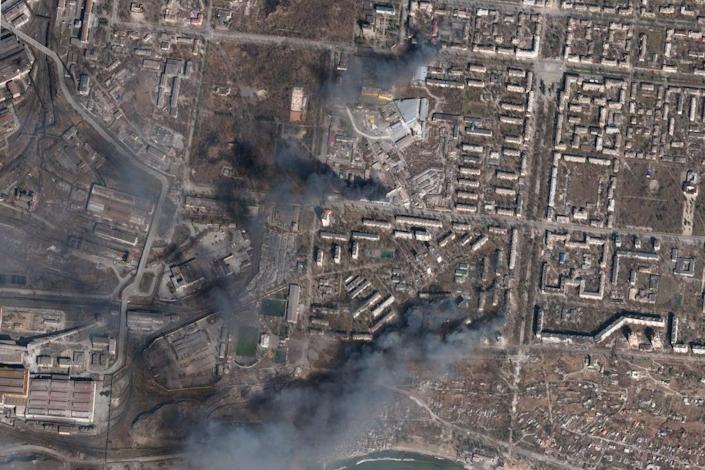Russia has been accused of bombing an art school providing shelter to hundreds of civilians in the besieged city of Mariupol and of deporting thousands of residents to an unknown fate inside Russian territory as Ukrainian president Volodymyr Zelensky warns of a third world war if talks with Vladimir Putin fail.
The southeastern port city has suffered the most brutal siege of Russia’s invasion, and many of its 400,000 residents have been trapped for more than two weeks with scant food, water and power as Mr Putin seeks to establish a land corridor to the Crimea peninsula it annexed from Ukraine in 2014.
Local officials said “several thousand” residents have been taken to Russia in the past week.
The apparent attack on the art school – where some 400 people were thought to be sheltering – came just days after Ukrainian officials reported a strike on a theatre in Mariupol, and more than 1,000 people were said to still be trapped in a bomb shelter under the building as of Friday.


At least 2,300 people have died in Mariupol, some of whom had to be buried in mass graves, according to local officials, while Mr Zelensky called the bombardment of the city a war crime.
“To do this to a peaceful city … is a terror that will be remembered for centuries to come,” the Ukrainian leader said in his nightly address to the nation on Saturday. “The more Russia uses terror against Ukraine, the worse the consequences for it.”
Nevertheless, he said peace talks with Moscow were necessary, and warned that there would be severe consequences if they failed.
“I think that we have to use any format, any chance in order to have the possibility of negotiating, the possibility of talking to Putin,” Mr Zelensky told CNN on Sunday. “But if these attempts fail, that would mean that this is a third world war.”


Turkey, which is attempting to mediate a ceasefire, said Russia and Ukraine were getting closer to agreement on “critical” issues.
Kyiv is willing to drop its bid to join Nato but wants certain security guarantees from Russia. Moscow is pressing for Ukraine’s complete demilitarisation.
Later on Sunday, Mr Zelensky addressed Israel’s parliament by video link and questioned its reluctance to sell missile defences to his country or sanction Russia for the invasion. In the speech, he likened the “final solution” that Nazi Germany sought to impose on the Jews to Moscow’s ambitions for Ukraine.


More than weeks into the invasion, the Russian advance on Ukraine’s major cities appears to have stalled. The Kremlin’s forces are instead concentrating efforts on artillery and missiles strikes, with analysts and western intelligence saying that Mr Putin has turned to a war of attrition that could result in many more civilian casualties.
The front lines between Ukrainian and Russian forces are “practically frozen” as Russia does not have enough combat strength to advance further, Mr Zelensky’s adviser Oleksiy Arestovych said on Sunday.
“[Over the past day] there were practically no rocket strikes on [Ukrainian] cities,” he said.
However, Mr Arestovych conceded that “there is currently no military solution to Mariupol” where fighting continued on Sunday.
The Russian governor of Sevastopol, which Moscow annexed from Ukraine in 2014, said that Post Captain Andrei Paliy, deputy commander of Russia’s Black Sea Fleet, had been killed in battle in Mariupol.


Mariupol’s city council issued a statement late on Saturday claiming that thousands of its residents had been “deported” to Russia in the last week. The US envoy to the UN, Linda Thomas-Greenfield, called the reports “disturbing” and “unconscionable” if true. Russian news agencies said buses had carried hundreds of people Moscow calls refugees from Mariupol to Russia in recent days.
Nearly 40,000 people have left the city – of their own will – in recent days despite the bombardment, according to local authorities. That amounts to nearly a tenth of the city’s pre-war population of 430,000.
“There is no city anymore,” Marina Galla told the Associated Press after escaping Mariupol, weeping in the doorway of a crowded train compartment that was pulling into the western city of Lviv near the Polish border.


Elsewhere in Ukraine, authorities in Kharkiv said five people, including a nine-year-old boy, were killed in overnight shelling, while the country’s human rights ombudswoman Lyudmyla Denisova claimed that more than 50 elderly people were killed in Luhansk region after a Russian tank fired at a care home.
Russia’s defence ministry said cruise missiles were launched from ships in the Black Sea and Caspian Sea, as well as hypersonic missiles from Crimean airspace.
The Kremlin said the nuclear capable Kinzhal missile hit a Ukrainian fuel depot in Kostiantynivka, a city near Mykolaiv, on Sunday, a day after it reported using the weapon for the first time to destroy an ammunition depot in Ivano-Frankivsk, western Ukraine.
Meanwhile, the UN has confirmed at least 902 civilian deaths in the war, and said that more than 10 million people had now been displaced across Ukraine, including some 3.4 million who have fled to neighbouring countries such as Poland.
The Independent has a proud history of campaigning for the rights of the most vulnerable, and we first ran our Refugees Welcome campaign during the war in Syria in 2015. Now, as we renew our campaign and launch this petition in the wake of the unfolding Ukrainian crisis, we are calling on the government to go further and faster to ensure help is delivered. To find out more about our Refugees Welcome campaign, click here. To sign the petition click here. If you would like to donate then please click here for our GoFundMe page




